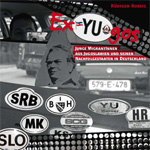Rüdiger Rossig | Journalist | Novinar
Trust Schengen
by Rüdiger Rossig
It’s been two and a half years since border controls were abolished between Germany and Poland, when they signed up to the Schengen border-free travel zone in Europe. Since then, the German media has continued to report on an increase in crime along the open border.
Many prejudices have been discarded since 1989 about Germany’s eastern neighbors who spent decades locked up behind the Iron Curtain. Still, for Germans living near the borders with Poland and the Czech Republic, there is still no question that “our” stolen cars generally head east.
That attitude ignores the statistics compiled by the crime fighters themselves. In an initial report published seven months after the German-Polish border was opened, the Interior Ministry of the German state of Brandenburg found out that, far from skyrocketing as was expected, crime in regions near Poland had actually fallen.
This trend continues unbroken but prejudices are tenacious things. After vacationing on the Polish Baltic coast last summer, my daughter’s friends asked her fearfully whether our car had been stolen. I was relieved when she answered, “They have their own cars there.”
Anyone harboring doubts need only drive for an hour on the A11 from Berlin toward Szczecin to see that cars with Polish plates are in no way inferior to German ones.
That has also been true of cars in Switzerland for a long time – to say nothing of other items not nailed down along the affluent German-Swiss border. Which is why it’s all the more interesting that there – far removed from the Iron Curtain – a discussion quite similar to that in Germany’s eastern reaches has been going on.
Ever since Switzerland joined the Schengen group, the country’s populist-nationalist SVP party has been demanding the country’s withdrawal. Schengen is a “supermarket for crime,” the SVP says, with the absence of border controls practically giving criminals on the other side an open invitation. By “the other side,” the SVP means Germany.
And, surprise, since controls were abolished in December 2008, more break-ins have been registered in the Swiss cantons along the German border. But they have nothing to do with open Schengen borders. The police commissioner of Berne Canton, Hans-Jürg Käser, told the daily Neue Zürcher Zeitung in an interview that cross-border crime had existed even before the country joined Schengen. Switzerland had never been completely sealed off and “the foreign criminals were already thoroughly familiar” with the uncontrolled “green” crossings.
One might add that the same applied to domestic, i.e. Swiss crooks. Certainly they had an easier time before Schengen in one respect: As soon as they set foot on German soil, they were beyond the reach of Swiss police.
That is what has changed through Schengen – not just along the Swiss border but the Polish one too. Now, both Polish and German border police can go on “hot pursuit” of the criminals deep into each other’s territory. For the good – and the safety – of locals.

 Deutsch
Deutsch  Naški
Naški  English
English 
